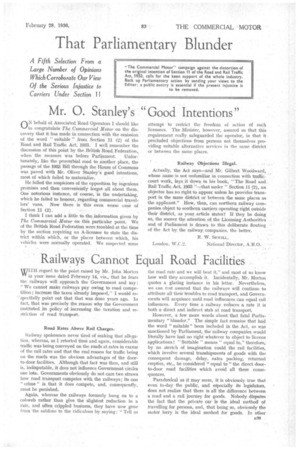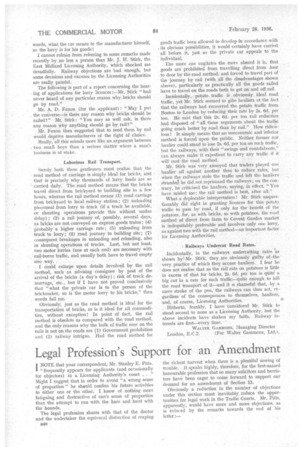Railways Cannot Equal Road Facilities
Page 53

Page 54

If you've noticed an error in this article please click here to report it so we can fix it.
WITH regard to the point raised by Mr. John Morton TV in your issue dated February 14, viz., that he fears the railways will approach the Government and say : " We cannot make railways pay owing to road competition; increase the taxes already imposed," I would respectfully point out that that was done years ago. In fact, that was precisely the reason why the Government instituted its policy of increasing the taxation and restriction of road transport.
Road Rates Above Rail Charges.
Railway spokesmen never tired of making that allegation, whereas, as I retorted time and again, considerable traffic was being conveyed on the roads at rates in excess of the rail rates and that the real reason for traffic being on the roads was the obvious advantages of the doorto-door facilities. Although that fact was then, and still is, indisputable, it does not influence Government circles one iota. Governments obviously do not care two straws how road transport competes with the railways; its one " crime " is that it does compete, and, consequently, .must be punished.
Again, whereas the railways formerly hung on to a cobweb rather than give the slightest reduction in a rate, and often crippled business, they have now gone from the sublime to the ridiculous by saying: "Tell us the road rate and we will beat it," and most of us know how well they accomplish it. Incidentally, Mr. Morton quotes a glaring instance in his letter. Nevertheless, we can rest assured that the railways will continue to attribute all their troubles to road transport, and Governments will acquiesce until road influences can equal rail influences. Every time a railway reduces a rate it is both a direct and indirect stab at road transport.
However, a few more words about that fatal Parliamentary "blunder." The simple fact remains that had the word "suitable" been included in the Act, as was . sanctioned by Parliament, the railway companies would literally have had no right whatever to object to licence applications! "Suitable " means " equal to," therefore, by no stretch of imagination could the rail facilities, which involve several transhipments of goods with the consequent damage, delay, extra packing, returned empties, etc., be considered "equal to "the direct doorto-door road facilities which avoid all these consequences.
Paradoxical as it may seem, it is obviously true that even to-day the public, and especially its legislators, does not realize that 'there is all the difference between a road and a rail journey for goods. Nobody disputes the fact that the private caris the ideal method of travelling for persons, and, that being so, obviously the motor lorry is the ideal method for goods. in other
words, what the car means to the manufacturer himself, so the lorry is for his goods !
I cannot refrain from referring to some remarks made recently by no less a person than Mr. J. H. Stirk, the East Midland Licensing Authority, which shocked me dreadfully. Railway objections are bad enough, but some decisions and excuses by the Licensing Authorities are really painful.
The following is part of a report concerning the hearing of applications for lorry licences :—Mr. Stirk "had never heard of any particular reason why bricks should go by road."
Mr. A. D. Foxon (for the applicant) : "May I put the converse—is there any reason why bricks should be railed?" Mr. Stirk: "You may as well ask, is there any reason why a.nythipg should go by rail?"
Mr. Foxon then suggested that to send them by rail would deprive manufacturers of the right of choice.
Really, all this sounds more like an argument between two small boys than a serious matter where a man's business is at stake.
Laborious Rail Transport.
Surely both these gentlemen must realize that the road method of carriage is simply ideal for bricks, and that is precisely why thousands of lorry loads are so carried daily. The road method means that the bricks travel direct from brickyard to building site in a few hours, whereas the rail method means (I) road carriage from brickyard to local railway station; (2) unloading piecemeal from lorry to truck (if a truck be available, or shunting operations provide this without undue delay) ; (3) a rail journey of, possibly, several days, as bricks are not, conveyed on express goods trains; (4) probably" a higher carriage rate ; (5) unloading from truck to lorry; (6) road journey to building site ; (7) consequent breakages in unloading and reloading, also in shunting operations of trucks. Last, but not least, two motor lorries (one at each end) are necessary with rail-borne traffic, and usually both have to travel empty one way.
I could enlarge upon details involved by the rail method, such as advising consignee by post of the arrival of the bricks (a day's delay) ; risk of truck demurrage, etc., but if I have not proved conclusively that "what the private car is to the person of the brickmaker, so is the motor lorry to his bricks," then words fail me.
Obviously, just as the road method is ideal for the transportation of bricks, so is it ideal for all commodities, without exception! In point of fact, the rail method is obsolete as compared with the road method, and the only reasons why the bulk of traffic now on the rails is not on the roads are (I) Government prohibition and (2) railway intrigue. Had the road method for
goods traffic been allowed to develop in accordance with . its obvious possibilities, it would certainly have carried all before it, just as the private car appeals to the individual.
The more one cogitates the more absurd it is, that goods are prohibited from travelling direct from door to door by the road method, and forced to travel part of the journey by rail (with all the disadvantages shown above), particularly as practically all the goods railed have to travel on the roads both to get on and off rail.
Incidentally, potato traffic is. obviously ideal road traffic, yet Mr. Stirk seemed to gibe hauliers at the fact that the railways had recovered the potato traffic from Boston to London by reducing their rate by 2s. 6d. per ton. He said that this 2s. 6d. per ton rail reduction had disposed of "all those arguments about the traffic going much better by road than by rail." How ridiculous! • It simply, means that an uneconomic and inferior method is forced upon the public. Neither farmer nor haulier could stand to lose 2s. 6d. per ton on such traffic, but the railways, with their "swings and roundabouts," can always make it expedient to carry any traffic if it • will oust the road method.
Mr. Stirk was very annoyed that traders played one haulier off against another thus to reduce rates, but when the railways stole the traffic and left the hauliers strand0 he did not reprimand the railways ; on the contrary, he criticised the hauliers, saying, in effect, " You have misled me; the rail method is best, after all."
What a deplorable interpretation! Mr. Stirk unquestionably did right in granting licences for this potato traffic to pass by road, if only for the benefit of the potatoes. for, as with bricks, so with potatoes, the road method of direct from farm to Covent Garden market is indisputably preferable and involves only one lorry, as against two with the rail method—an important factor for Licensing Authorities.
Railways Undercut Road Rates.
Incidentally, in the railways undercutting rates as shown by Mr. Stirk, they are obviously guilty of =the very, practice of which they accuse hauliers. I fear he does not realize that as the rail rate on potatoes is little in excess of that for bricks, 2s. 6d. per ton is quite. a big cut in a rate for such traffic—quite enough to kill the road transport of it—and it is shameful that, by a mere stroke of the pen, the railways can thus act, regardless of the consequences to themselves, hauliers, and, of course, Licensing Authorities.
• Hitherto, frankly, I have considered Mr. Stirk to stand second to none as a Licensing Authority, but the above incidents have shaken my faith. Railway interests are first—every time.
WALTER GAMMONS, Managing Director London, E.C.2. (For Walter Gammons, Ltd.).




























































































